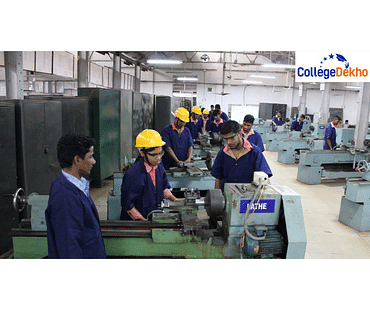The ITI Turner syllabus is divided into two parts: 1st year and 2nd year. The 1st year syllabus comprises trade theory and engineering drawing, while the 2nd year syllabus includes practical work and workshop calculation and science. Check the detailed syllabus of ITI Turner here.

ITI Turner Syllabus: The syllabus of ITI Turner is constructed in such a way that it provides ITI trainees with the necessary skill set and knowledge to work as turners in industries like manufacturing, production, construction, etc. The ITI Turner syllabus covers significantly a wide range of topics like workshop calculations and science, engineering drawing, practical skills, and safety processes.
Under the Craftsman Training Scheme (CTS), ITI in Turner Trade is one of the most favoured courses offered nationally by the network of ITIs. The duration of the course is two years. Core area and domain area make up the majority of the Turner trade syllabus. Professional skills and knowledge are imparted in the domain area of trade theory and practicals, while the essential core skills and knowledge are imparted in the foundational areas of workshop calculations, science, engineering drawing, and employability skills.
Candidates willing to take up the ITI Turner trade can check the syllabus of ITI Turner here in this article. The syllabus can be divided into first-year syllabus and second-year syllabus. B
Also Read:
| ITI Admission 2024 (Open) |
|---|
ITI Turner First-Year Syllabus
Students can check the first-year ITI Turner syllabus from the below table.
Syllabus | Topics Covered |
|---|---|
Trade Theory |
|
Workshop Calculation and Science |
|
Engineering Drawing |
|
Practical |
|
Second-Year Syllabus of ITI Turner
Candidates can check the second-year syllabus here from the below table.
Syllabus | Topics |
|---|---|
Trade Theory |
|
Workshop Calculation and Science |
|
Engineering Drawing |
|
Practical |
|
Structure of ITI Turner Trade
The distribution of training hours across this trade can be checked here in the below table.
Trade Syllabus | Training Hours | |
|---|---|---|
1st Year | 2nd Year | |
Practical | 1000 | 1000 |
Trade Theory | 280 | 360 |
Workshop Calculation and Science | 80 | 80 |
Engineering Drawing | 80 | 80 |
Employability Skills | 160 | 80 |
Total | 1600 | 1600 |
Mode of Assessment
Candidates will be assessed on their performance based on the following parameters:
- Work in labs/workshop
- Record Book
- Answer scripts of examinations
- Viva
- Report charts
- Attendance record and punctuality
- Assignments
- Project works
Marking Scheme for Internal Assessment
Candidates can follow the below table to learn about the marking scheme for internal assessment.
Grade | Particulars |
|---|---|
60% to 75% |
|
75% to 90% |
|
Above 90% |
|
The syllabus of ITI Turner is designed to best serve students with the appropriate skill set and foundation knowledge that will assist them in excelling in the field of manufacturing and machinery. The ITI Turner Syllabus covers both the practical know-how and also theoretical concepts that ensure candidates are proficient in whichever industry they enter. Moreover, the curriculum fosters a wholesome technical expertise along with the development of problem-solving skills, making students an asset in today’s disrupting market.
To get guidance for admission to top ITI colleges in India, feel free to dial our toll-free number 1800-572-9877 or fill out CollegeDekho’s Common Application Form . An admissions counsellor will be assigned to you to make your journey hassle-free. In case of any queries or concerns, you can write to us in the QnA zone .Related Article:
FAQs
The ITI Turner trade is typically a 2-year program, divided into 4 semesters.
The ITI Turner course concentrates on the turning process, which is using a lathe to shape metal. On the other hand, the machinist trade encompasses not only turning but also milling, grinding, and drilling, among other machining operations.
Within the wider field of machining, the ITI Turner trade is a specialisation. With extra coursework, students can, however, focus even more on subjects like tool and die-making or CNC turning.
The candidate must have finished their matriculation, or tenth grade, with Science and Math mandatory courses. The minimum age for enrollment in the Turner trade is usually 14 years.
The ITI Turner course is a vocational training program that focuses on the machining process known as turning. Students who study this trade will be able to operate lathes and other machine tools to create precise metal components.
















Similar Articles
ITI Admissions in India 2026: State-wise Dates, Online Form, Fees, Merit List, Courses and Fees
West Bengal (WBSCVT) ITI Admission 2026: Registration, Merit List, Seat Allotment
List of Government Jobs after ITI: Job Roles, Eligibility, Salary, Recruitment Process
Best ITI Courses After 12th in 2025: Stream-wise, ITI Courses List, Types of Courses
Tamil Nadu ITI Admission 2026: Eligibility, Trades Offered, Colleges List, and Counselling Process
Jharkhand ITI Admission 2025: Spot Round Admission (Ongoing), Trades Available, Top ITI Colleges, Admission Process